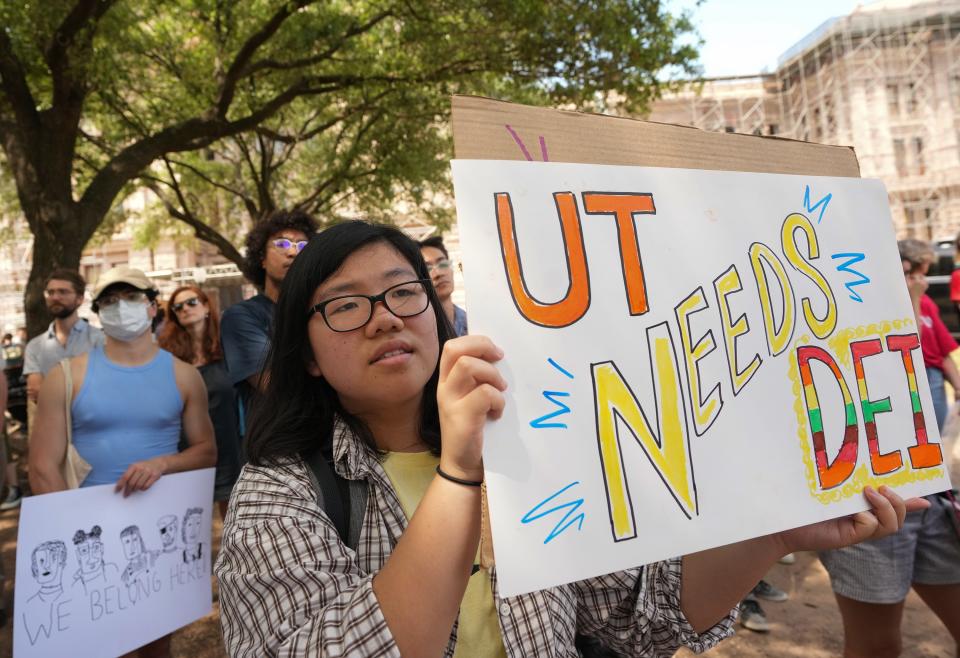Texas House approves bill banning DEI offices at public colleges, universities
The Texas House on Monday gave final approval to a bill that would prohibit Texas public colleges and universities from maintaining diversity, equity and inclusion offices despite hours of impassioned efforts from Democrats to amend or halt the legislation.
In an 83-62 vote, the lower chamber approved its version of Senate Bill 17, filed by Rep. John Kuempel, R-Seguin. His bill also would ban higher education institutions from requiring DEI statements and DEI training.
It defines DEI offices as an office that provides different treatment to people based on race, sex, color or ethnicity through any policies, procedures, trainings, programs or activities.

On Friday, before the bill's initial consideration in the House, Democratic members made several unsuccessful points of order on both SB 17 and Republican amendments to the bill as part of an effort to weaken or kill the legislation. They also proposed about 20 amendments that did not pass but effectively forced Republican lawmakers to delay the official vote on the bill until nearly 11 p.m.
Texas Legislature: House delays considering changes to tenure after Democrats raise challenge
In an apparent compromise, the bill's author eventually ended the onslaught of amendments from Democrats by proposing an amendment of his own that the House adopted before approving the legislation. The new amendment would require the Texas Higher Education Coordinating Board to conduct a yearly study on how the bill affects recruitment and retention for college students. The board oversees public universities and colleges in the state.
If the bill is enacted, the amended language states that higher education institutions must make efforts to reassign employees into jobs with similar pay if their position would be eliminated by the bill. It also moved the bill's effective date from Sept. 1, 2023, to Jan. 1, 2024.
SB 17 now heads back to the Senate, where members will need to sign off on the changes the House made. If the Senate does not approve, the bill would be referred to a conference committee that would propose a new version of the bill to both chambers for final consideration on whether to send the legislation to Gov. Greg Abbott to sign into law.
Lt. Gov. Dan Patrick, who oversees the Senate, has said the bill is one of his priorities this legislative session, which ends Monday.
Divide over DEI offices, programs
Republican state lawmakers have said the legislation is necessary because they believe DEI programs are causing division in college campuses and have a "chilling effect" on faculty and student speech.
While laying out the bill Friday, Kuempel claimed that there was "virtually no evidence" from any Texas higher education institution that DEI programs had closed the gap with minority student outcomes, minority recruitment or faculty hiring.
Senate Bill 15: Texas House OKs bill to limit on transgender college athletes participation in sports
"What this bill does is make sure that we can actually accomplish our goal of promoting diversity rather than using diversity to create a narrow, closed-minded environment," said Kuempel, chair of the House Committee on Higher Education.
However, opponents of the legislation, including several Democratic lawmakers, University of Texas students and faculty members, have strongly disputed Kuempel's claim. They say DEI offices and other initiatives need to remain on campuses because they help people of color feel more included and thrive on campus.
"Diversity is not a threat. Equitable access to education is not a threat. Inclusion is not a threat," Rep. Victoria Neave Criado, D-Dallas, said while debating the bill Friday. "We turn our cheek away from the real threats that our communities face — the threats of gun violence, threats of poverty, housing insecurity, the threat of illiteracy."
The House initially was set to consider a scaled-back version of SB 17, compared with the legislation that the Texas Senate passed last month, although both versions of the bill still proposed bans on universities having DEI offices, requiring DEI statements and implementing mandatory DEI training.
More: State lawmakers, Huston-Tillotson students launch Texas HBCU Legislative Caucus
However, during Friday's debate, the House approved an amendment from Kuempel, by an 81-57 vote, that added much of the language from the Senate version into the House substitute of the bill.
What's in the new version of Senate Bill 17?
Kuempel's bill as amended allows college students or employees to sue their university for "injunctive or declaratory relief" if they are required to participate in any DEI training.
It also would require the state auditor to conduct audits of public colleges and universities at least every four years to determine if the schools have spent state money in violation of the law.
If institutions violate the law, they would need to resolve the violation within 180 days or they would be ineligible to receive formula funding increases or funding for "exceptional items" in the following biennium.
Rally at Texas Capitol: Why Texas students, faculty say DEI, tenure is needed in colleges
The House also approved adding a provision that would allow colleges to submit statements to highlight their work serving first-generation, low-income and underserved students when applying to grants or complying with accreditation requirements, replacing a similar section in the original bill.
The bill still includes a section stating it does not apply to academic course instruction, research, activities by student organizations, student recruitment or admissions.
Unlike the Senate bill, the House's version of SB 17 also adds language about the purpose of higher education to the state's education code. The language is pulled verbatim from Senate Bill 16, dubbed the "critical race theory" bill.
The text states that all "public higher education institutions must be committed to creating an environment of intellectual inquiry, academic freedom and intellectual diversity so students are respected and prepared for the workforce."
This article originally appeared on Austin American-Statesman: Texas Legislature: House OKs bill banning DEI offices at universities

